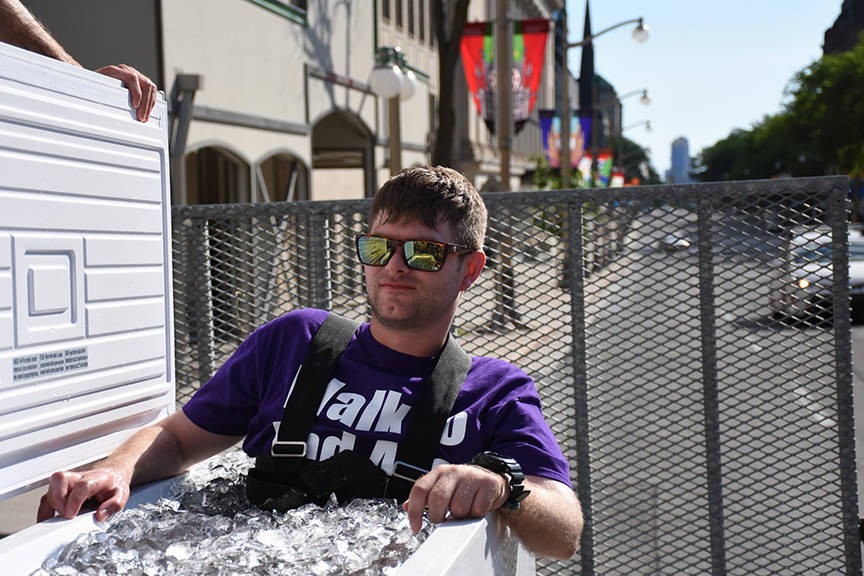
‘I want to come home, but there are no treatment options in B.C.,’ says man diagnosed with ALS
Published in Burns Lake Lakes District News February 10, 2021, written by Priyanka Ketkar
Deane Gorsline, a former Burns Lake and Quesnel resident was diagnosed with Amyotrophic Lateral Sclerosis (ALS) at the age of 29 and ever since his life has been about seeking treatment options and bringing hope to others like him.
Gorsline grew up in the small communities of Burns Lake and Quesnel, before leaving to join the Royal Military College of Canada in 2007, where he studied civil engineering and trained to be a combat engineer officer.
“He was always a child who was high energy, pushed the limits and lived life to the fullest. He went to high school in Quesnel and played all the sports and was an all-out Canadian kid. He also became a combat driver and went through quite a gruelling selection process and served in Afghanistan at around 24 years of age,” said Barbara Gorsline, Deane’s mother.
Deane found out he had ALS, also known as Lou Gehrig’s disease, on Dec. 24 2018. His speech started deteriorating and gradually his muscles started atrophying.
Gorsline’s mother, Barbara looked up the best possible treatment options for him and booked an appointment for him at the Massachusetts General Hospital with the head neurologist. In Boston, Gorsline and his wife Danielle received information on several clinical trials and treatment options across the world. One opportunity that was identified was a new mesenchymal stem cell procedure in Seoul, Korea. Gorsline’s close friend initiated a Go Fund Me that raised $75,000 CAD in one month, following which he traveled to Korea on five occasions for three stem cell injections.
“I want to come home, but there are no treatment options in B.C,” said Gorsline, who is currently living in Ottawa.
“Canada is way behind and we don’t have clinics with specialists trained in ALS and that’s a huge problem right now in this country. Here, after the diagnosis, they basically say, ‘OK well get your things in order and come back when you need a wheelchair and basically go home to die.’ That’s the extent of treatment available in Canada and it wasn’t until he went to Boston that he had a first class diagnostic and treatment centre. It was entirely on a different level,” said his mother.
READ MORE: Fundraising underway for former Smithers resident diagnosed with ALS
Gorsline, who once served in the military is today bound to a wheelchair, unable to move without assistance and with extremely strained speech.
“The military doesn’t know why but they recognize it as a disease they cover in terms of benefits in the military,” said his mother.
“The military has really taken great care of me. Military recognizes that you have two to three times the likelihood of getting ALS,” said Gorsline who further noted that while he has had the military’s support through things like getting the apartment fitted with accessible ramps and other things, getting acess to latest technology, he shuddered to think how difficult it is for civilians who don’t have that kind of a support.
Not only has Gorsline taken the diagnosis and sought hope, his idea of service has extended beyond the military, to serving others suffering from ALS.
“Not once has he said ‘why me’, or ‘poor me’ nothing. In fact, he realized that the ALS population is so under-serviced and so unrepresented and so ignored that he felt a duty to serve and so he was a founding member of the group ALS Action Canada and then he became the chairman of that group,” said Gorsline’s mother, who is also part of the group.
Gorsline has been advocating for things that are problematic in Canada for ALS which is quick approval to drugs to treat the disease. According to his mother, there are some very promising drugs finishing up in U.S.A. and if those drugs are approved by FDA, the group wants them approved in Canada almost simultaneously.
Last year, Gorsline organized an ALS Burpee challenge and a walk to end ALS calling it “Deane’s walk to end ALS” that was aimed to bringing attention to the slow drug approval process and its impact on families living with the disease.
“He created that walk to represent the number of patients that died between the approval of the very first drug that was approved by Health Canada and the first province to do that was Quebec. They took 574 days and in that time 1,700 ALS patients died and that drug shows a minimal delay in symptoms and it is not curative. But on the horizon, they are discovering things and it could be tomorrow, but we can’t wait 574 days for the approval process, I mean, Deane will be dead and so will many other people in our group if we have to wait that long,” said his mother.
Gorsline will soon be announcing his walk to end ALS for this year and the drive would basically be held to make noise and advocate for quicker approval times for promising new drugs that are on the horizon. It is also to bring research trials to Canada that allows for patients to get treatments quickly.
“If you meet anyone else with ALS in your journey, tell them there is a person and also other people with ALS Action Canada fighting for better access and tell them, there is hope,” said Gorsline.
Join our fight to #EndALS!
Sign up as to receive periodic email updates and join our circle of supporters!